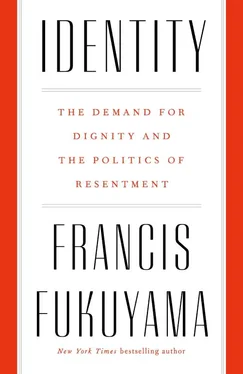This argument is made in Craig J. Calhoun, “Social Solidarity as a Problem for Cosmopolitan Democracy,” in Identities, Affiliations, and Allegiances , ed. Seyla Benhabib, Ian Shapiro, and Danilo Petranovic (Cambridge: Cambridge University Press, 2007).
A classic argument for national identity as one of the necessary conditions of modern liberal democracy was made by Dankwart A. Rustow, “Transitions to Democracy: Toward a Dynamic Model,” Comparative Politics 2 (1970): 337–63.
Zoltan L. Hajnal and Marisa Abrajano, White Backlash: Immigration, Race, and American Politics (Princeton, NJ: Princeton University Press, 2016).
Pierre Manent, “Democracy Without Nations?,” Journal of Democracy 8 (1997): 92–102. See also Fukuyama, Political Order and Political Decay , 185–97.
On the origin of the Universal Declaration, see Mary Ann Glendon, A World Made New: Eleanor Roosevelt and the Universal Declaration of Human Rights (New York: Random House, 2001).
Martha C. Nussbaum, For Love of Country: Debating the Limits of Patriotism (Boston: Beacon Press, 1996); Craig J. Calhoun, “Imagining Solidarity: Cosmopolitanism, Constitutional Patriotism, and the Public Sphere,” Public Culture 13 (1) (2002): 147–71; Samuel Scheffler, Boundaries and Allegiances: Problems of Justice and Responsibility in Liberal Thought (Oxford: Oxford University Press, 2000).
See Stewart Patrick, Sovereignty Wars: Reconciling America with the World (Washington, DC: Brookings Institution Press, 2017); Stephen D. Krasner, Sovereignty: Organized Hypocrisy (Princeton, NJ: Princeton University Press, 1999).
This is argued in Sunil Khilnani, The Idea of India (New York: Farrar, Straus and Giroux, 1998).
This story is told in Fukuyama, Political Order and Political Decay , 322–34.
This section is based on my Latsis lecture “European Identity Challenges.”
The theory of this view was outlined by Jürgen Habermas; see inter alia Habermas, The Postnational Constellation: Political Essays (Cambridge, MA: MIT Press, 2001); “Citizenship and National Identity: Some Reflections on the Future of Europe,” Praxis International 12 (1) (1993): 1–19. See also Ghia Nodia, “The End of the Postnational Illusion,” Journal of Democracy 28 (2017): 5–19.
On national identity in the EU, see Kathleen R. McNamara, The Politics of Everyday Europe: Constructing Authority in the European Union (Oxford: Oxford University Press, 2015).
T. Alexander Aleinikoff and Douglas B. Klusmeyer, eds., From Migrants to Citizens: Membership in a Changing World (Washington, DC: Carnegie Endowment for International Peace, 2000), 1–21; Gerhard Casper, “The Concept of National Citizenship in the Contemporary World: Identity or Volition?” (Hamburg, Germany: Bucerius Law School, 2008).
Aleinikoff and Klusmeyer, From Migrants to Citizens , 32–118.
Rogers Brubaker, Citizenship and Nationhood in France and Germany (Cambridge, MA: Harvard University Press, 1992).
Marc Morje Howard, The Politics of Citizenship in Europe (New York: Cambridge University Press, 2009), 119–34; Nergis Canefe, “Citizens v. Permanent Guests: Cultural Memory and Citizenship Laws in a Reunified Germany,” Citizenship Studies 2 (3) (1998): 519–44.
Chikako Kashiwazaki, “Citizenship in Japan: Legal Practice and Contemporary Development,” in Aleinikoff and Klusmeyer, From Migrants to Citizens .
Sara W. Goodman, “Fortifying Citizenship: Policy Strategies for Civic Integration in Western Europe,” World Politics 64 (4) (2012): 659–98; Robert Leiken, Europe’s Angry Muslims: The Revolt of the Second Generation , repr. ed. (Oxford: Oxford University Press, 2015). A number of his conclusions seem a bit dated today in light of recent terrorist attacks in France.
“Discussion Guide for the Naturalization Authorities—Status 01.09.2005,” Country Commissioner for Data Protection Baden-Württemberg. September 1, 2005, https://www.baden-wuerttemberg.datenschutz.de/gesprachsleitfaden-fur-die-einburgerungsbehorden-stand-01-09-2005/. See also Simon McMahon, Developments in the Theory and Practice of Citizenship (Newcastle upon Tyne, U.K.: Cambridge Scholars, 2012), 29ff.
For empirical evidence of prejudice faced by French Muslims, see David Laitin, Claire L. Adida, and Marie-Anne Valfort, Why Muslim Integration Fails in Christian-Heritage Societies (Cambridge, MA: Harvard University Press, 2016).
For a history of UKIP see Robert Ford and Matthew Goodwin, Revolt on the Right: Explaining Support for the Radical Right in Britain (London: Routledge, 2014).
Alan G. R. Smith, The Emergence of a Nation-State: The Commonwealth of England, 1529–1660 (London: Longman, 1984), 89.
Tweeted on August 12, 2017.
Quoted in Smith, Political Peoplehood , 150, 152.
Ibid. Paine quoted in Gerhard Casper, “Forswearing Allegiance,” in Jahrbuch des öffentlichen Rechts der Gegenwart , ed. Peter Häberle (Tübingen, Germany: Mohr Siebeck, 2013), 703.
See Ramon Lopez, “Answering the Alt-Right,” National Affairs 33 (2017): www.nationalaffairs.com/publications/detail/answering-the-alt-right.
William A. Galston, Anti-Pluralism: The Populist Threat to Liberal Democracy (New Haven, CT: Yale University Press, 2018), 39.
Samuel P. Huntington, Who Are We? The Challenges to America’s National Identity (New York: Simon and Schuster, 2004), 59.
See for example Carlos Lozada, “Samuel Huntington, a Prophet for the Trump Era,” Washington Post , July 18, 2017.
According to the OECD, Americans work an average of 34.29 hours per week, compared to an EU average of 33.23, and 39.79 in Korea. However, these averages include part-time workers, of whom there are proportionately more in the United States; average weekly hours for full-time U.S. workers is 47. See OECD (2018), Hours worked (indicator). DOI: 10.1787/47be1c78-en (accessed on February 14, 2018).
The U.S. citizenship oath is at https://www.uscis.gov/us-citizenship/naturalization-test/naturalization-oath-allegiance-united-states-america. For a detailed history of the naturalization oath, see Casper, “Forswearing Allegiance,” in Häberle, Jahrbuch . See also T. Alexander Aleinikoff, “Between Principles and Politics: US Citizenship Policy,” in Aleinikoff and Klusmeyer, From Migrants to Citizens .
Contrary to the oath of naturalization, the United States has come to permit dual citizenship as well. This was not the result of a deliberate act of Congress, but the result of various judicial and administrative decisions driven ultimately by political expediency. See Casper, “Concept of National Citizenship.”
Читать дальше












